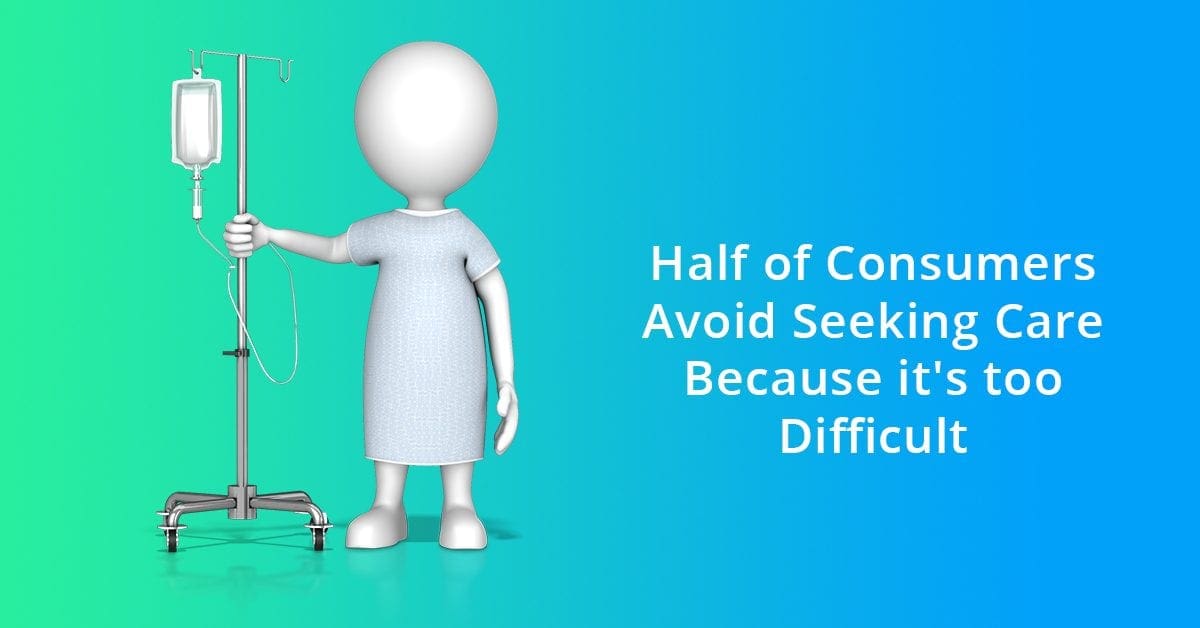Call us toll-free: 800-878-7828 — Monday - Friday — 8AM - 5PM EST

By Jeff Lagasse for Healthcare Finance
Finding, accessing, and paying for healthcare in America requires so much work that half of consumers have avoided seeking care altogether, a new survey has found.
More than two-thirds of consumers said every step of the healthcare process is a chore. Most said they don’t know how much a treatment or visit costs until months later, and nearly all said they want shopping for healthcare to be as easy as shopping for other common services – including using it as a fully connected digital experience.
The findings and more are detailed in the 2020Change Healthcare – Harris Poll Consumer Experience Index, a national survey of 1,945 consumers conducted by the Harris Poll and commissioned by Change Healthcare. Researchers asked consumers to rate the ease or difficulty required to find, access, and pay for care across 29 tasks, using an index of 1 to 200, with 200 being the “hardest” effort, 1 being “effortless,” and anything above 100 being “difficult.”
The result: Not one healthcare activity was described by consumers as effortless. Rather, consumers ranked the difficulty of dealing with the healthcare system as high as 149, and the average across all tasks at 117.
WHAT’S THE IMPACT?
What this means, in effect, is that the effort required to access and pay for care has in itself become a social determinant of health. Consumers want a simpler system that’s less fragmented, which opens up an opportunity for payers and providers. If they offer a more streamlined experience, they’ll in turn gain a competitive market advantage.
The survey yielded a few specifics. For one, consumers want accurate cost estimates from payers and price transparency from providers. More than half (53%) said they avoided care because they weren’t sure what it would cost; six in 10 have gone to an appointment without knowing if they could afford it; 68% reported they don’t know how much a treatment or appointment will cost until months later; and an overwhelming 85% said it should be as easy to compare prices for healthcare as it is for other consumer services.
Consumers also find the healthcare system overwhelmingly and unnecessarily complex. A majority (62%) said the healthcare system feels like it’s designed to be confusing, 61% reported their bills feel more complex than a mortgage payment, and two-thirds said they are asked to manage so many care-related tasks that they “feel like a general contractor” when it comes to addressing their healthcare needs.
Related to that, consumers want better, clearer, easier communications from health plans and providers, with a preference for digital channels. One chief request is for a simple, transparent Explanation of Benefits/explanation of charges. Only one in three consumers said their provider and health plan communicate too much. The vast majority said they want their health plan (71%) and provider (68%) to communicate using more modern platforms.
It’s evident from the results that health plans and providers would do well to score points with the all-digital consumer. Patients overwhelmingly are seeking a retail-like e-commerce experience when it comes to shopping for care: 81% said shopping for healthcare should be as easy as shopping for other common services, 76% said they wish there was a single place they could shop for and buy healthcare, and 67% said they want to shop for healthcare entirely online.
Of course, no 2020 healthcare-related survey would be complete without taking into account COVID-19. A majority of consumers agreed COVID-19 will fundamentally change healthcare delivery (81%), with most believing the pandemic will speed digital adoption. Eight in 10 said COVID-19 made telehealth “an indispensable part of the healthcare system,” 65% said they plan to use telehealth more after the pandemic, and 78% said COVID-19 has shown how badly the U.S. needs more telehealth options.
THE LARGER TREND
Avoiding care for various reasons has unfortunately become something of a running theme in 2020. In April, West Health and Gallup found that roughly one in seven Americans say they would avoid seeking medical care if they experienced key symptoms associated with COVID-19 out of fear of the potential cost.
When presented with a scenario in which they experience telltale signs of COVID-19 such as a fever and a dry cough, 14% of U.S. adults say they would avoid seeking medical attention due to cost. Even when asked to specifically suspect themselves infected with coronavirus, 9% would still avoid treatment, suggesting gaps in insurance coverage, poor finances or incomplete knowledge of the key symptoms of COVID-19.
More than 20% of adults under 30, non-whites, those with a high school education or less and those in households with incomes under $40,000 per year were the groups most likely to avoid care.
